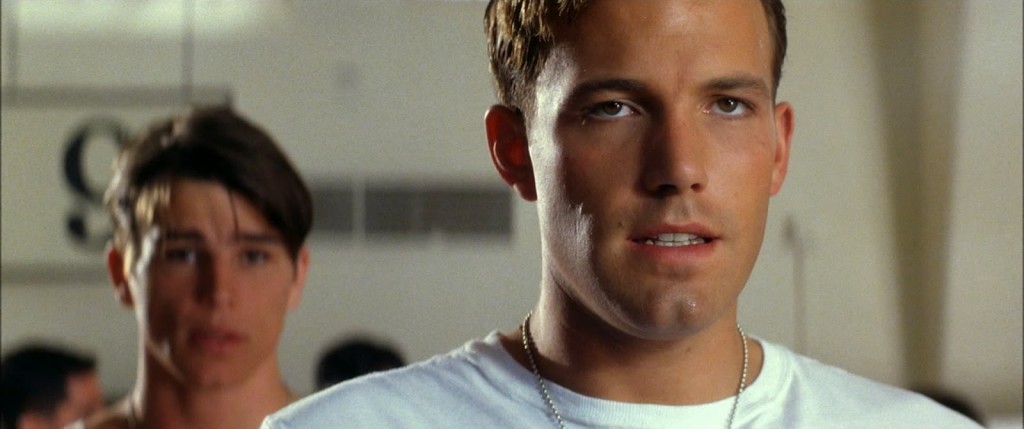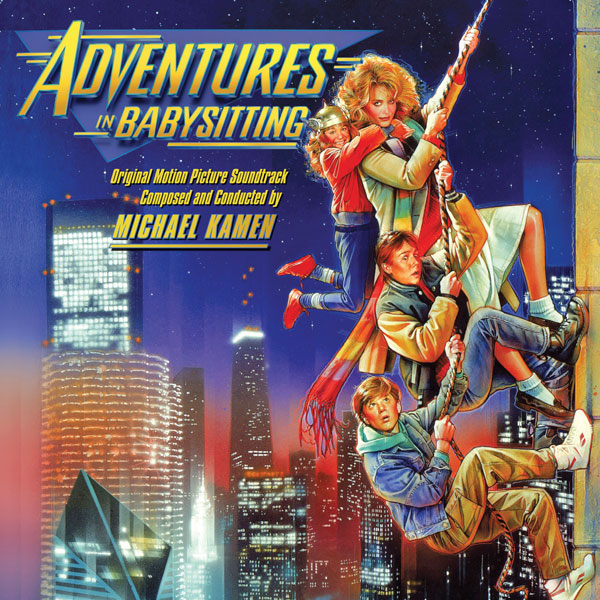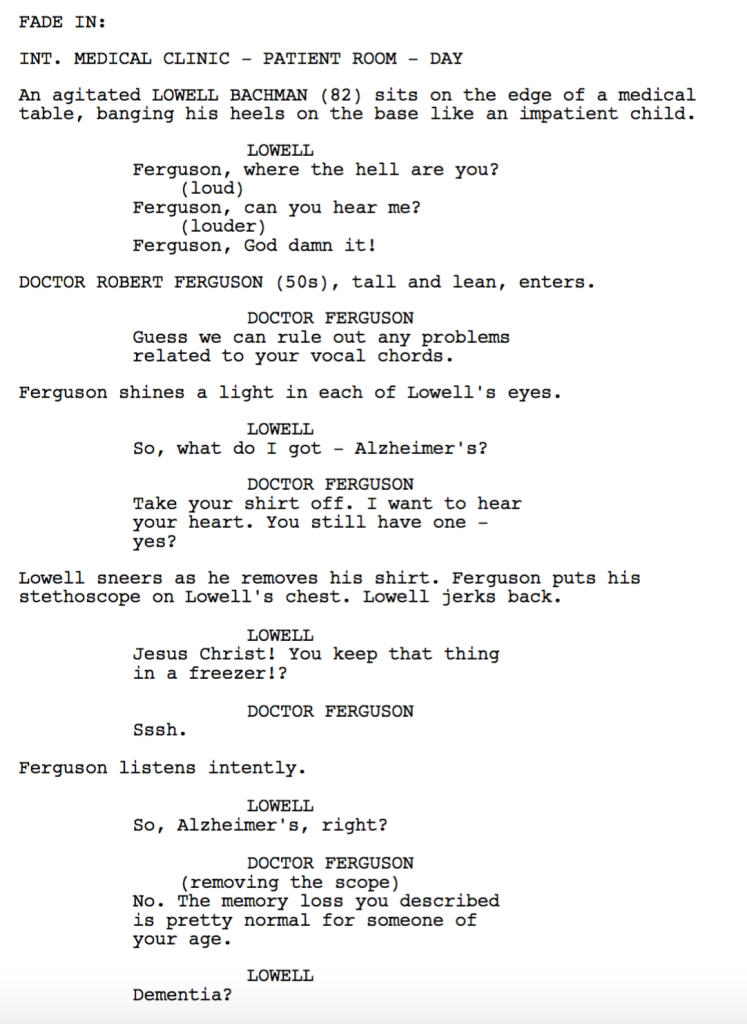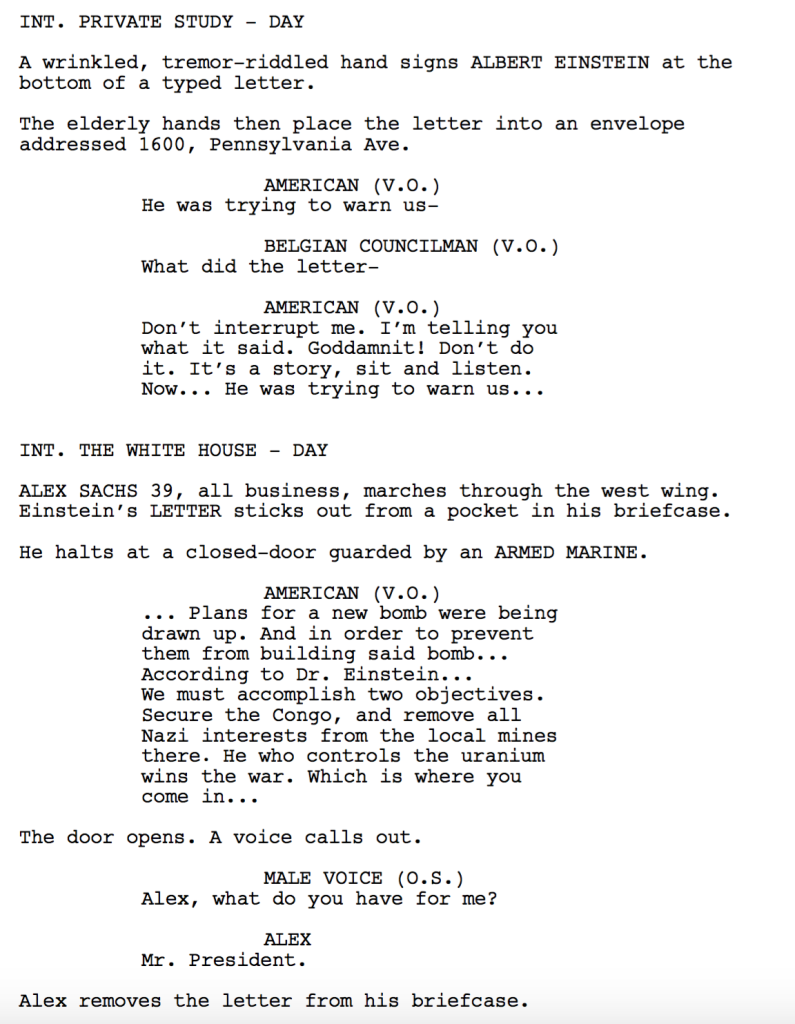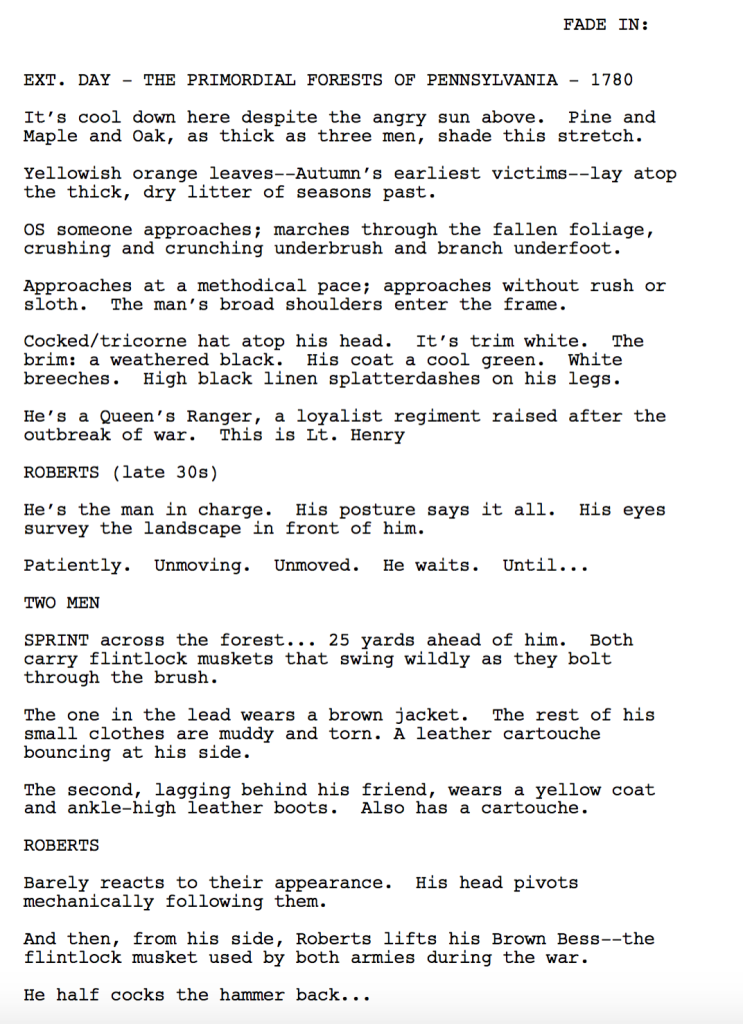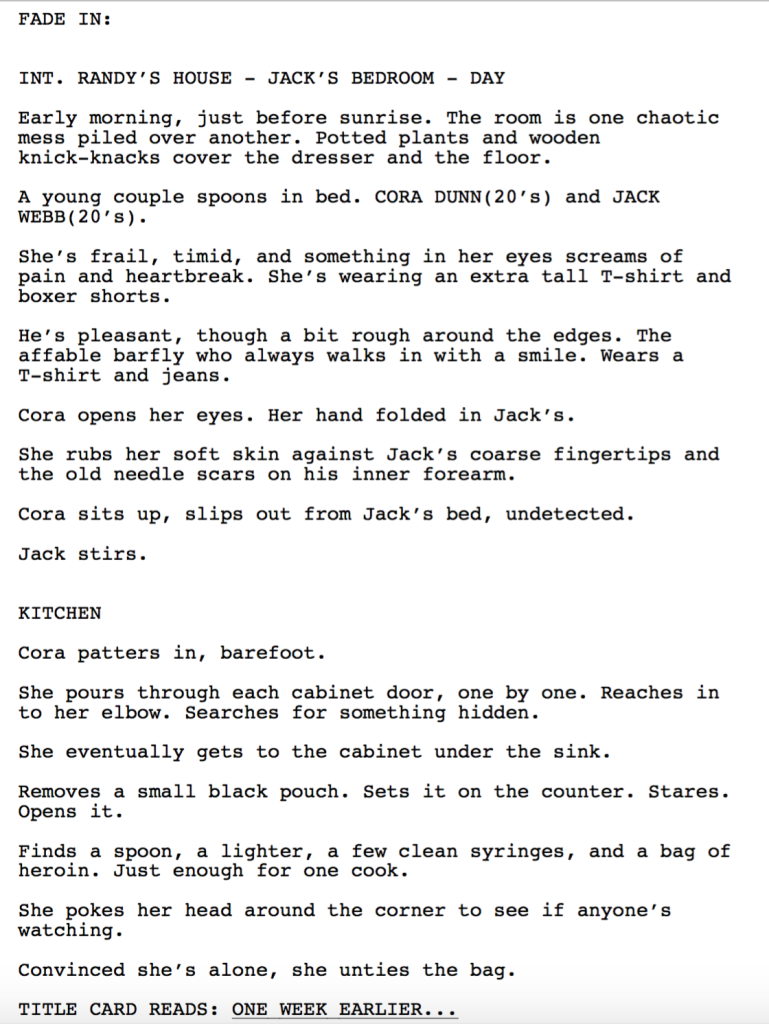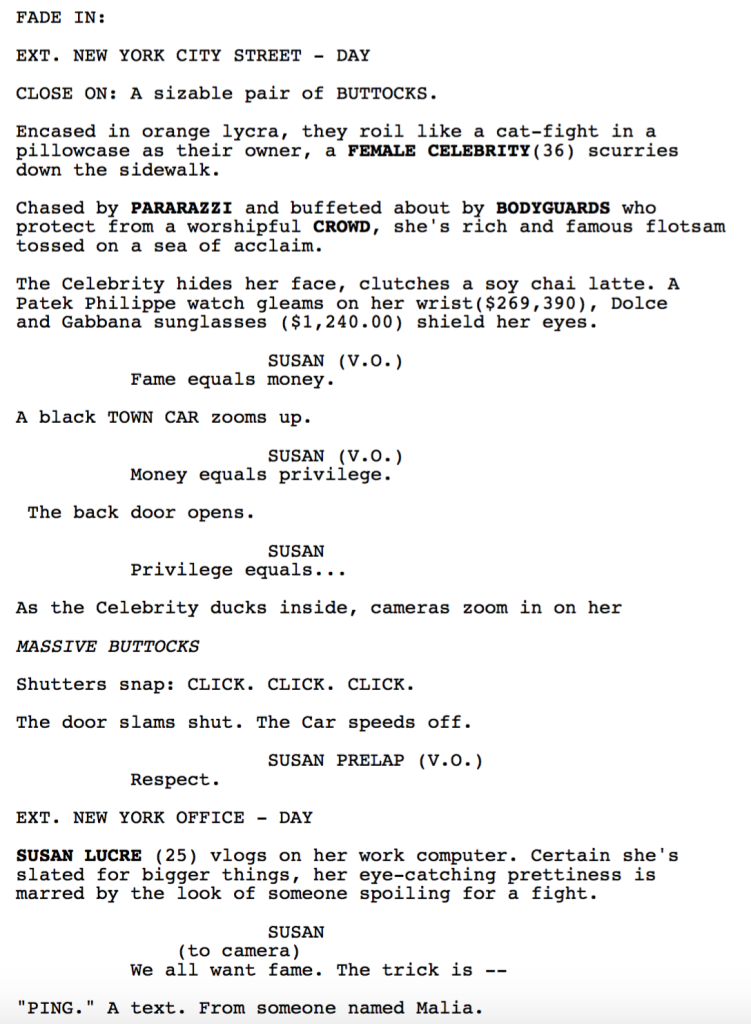Yesterday’s celebration of the great country we live in led to thoughts of the not so nice things about the country we live in. I’m talking, of course, about Michael Bay movies. I remember July 4th of 2001 like it was yesterday. It was the day Michael Bay’s Pearl Harbor came out (it actually came out May 25 but just go with it for the sake of the article). The highly hyped film was suppose to be Bay’s version of Titanic. It was Titanic alright. A Titanic disaster. Actually, it was worse than a disaster. It was forgettable. The reason Bay’s movies are so forgettable is because he’s awful with character. He has zero understanding of what a character needs in order to emotionally resonate with audiences. Which makes sense when you consider he emerged from the world of commercials, where it was more about the product than the character selling the product. So to Mr. Bay and all other storytellers out there, today’s article is a cure for the Bad Character Blues. That’s right. Ten tips… to improve your characters right now!
Clear objectives – A character without a clear objective is an aimless wanderer. The audience becomes frustrated by that aimlessness and inevitably finds the character boring, or worse, annoying. The thing about objectives is that it’s so simple to incorporate them. In Jumanji, our characters’ objective is to return the jewel to its statue. Then they get to go home. How easy is that?
Unresolved relationships – Characters should have an unresolved issue with at least one other character in the movie. How compelling you make this issue plays an enormous part in how entertaining your script is. That’s because issues lead to conflict, and conflict is what you need to write good scenes between characters. Therefore, you want to get this right. In A Quiet Place, the dad has a broken relationship with his daughter, who’s become sick of all the rules they have to abide by as well as not allowing her to grow up. Take note of how simple that conflict is. I’m pointing that out because writers often think they need relationship conflict that’s really complex. No, it’s often simple universal things that every person experiences.
An inner battle – Give your main character something they’re battling internally. It could be a compulsion, like OCD, a vice, like meth, a fear or flaw, like standing up for themselves, or anything that involves an unresolved problem from within. This is one of the most important ingredients to breaking a character out of the 2-D mould and making them 3-D. A huge component of the human condition are the battles we fight within ourselves. Your characters should be no different.
Conflict with the past – Characters should have some unresolved conflict with their past. I call this the “fourth dimension,” as it takes your character from 3-D to 4-D. A character will have conflict with the external (1-D), other characters (2-D), the internal (3-D), and the past (4-D). It might be a traumatic event. It could be a death that wasn’t properly mourned. But it often has something to do with family. Every human being has a complex relationship with their family growing up, which is why it’s such a great place to look for this conflict. Good Will Hunting had to get past his abusive father in other to move forward.
A dash of good in the bad and a dash of bad in the good – A character who’s 100% good is boring. A character who’s 100% bad is boring. So you want to mix a little of each into the other. Denzel Washington in The Equalizer is a REALLY GOOD GUY. But he’s got a dark side. He’s a relentless killer, even enjoys it a little. It’s that edge that makes the character pop. Thanos is a REALLY BAD PURPLE GUY. But he’ll also sit down and talk to you in a calm logical manner. Those little splashes of good and bad are what keep a character from becoming cliche-bait.
Personality – This is one of the BIGGEST omissions I see in character-creation. Characters with zero personality. The writer then wonders why readers aren’t engaged. These are MOVIE CHARACTERS, guys. You thought them worthy of entertaining audiences for two hours. So give them some personality dammit! That doesn’t mean they have to be big and outlandish like Jim Carrey in The Mask. Personality can be dry humor, sarcasm, charm, attitude, arrogance. And every trait is scaleable. You can go big with humor or you can make it subtle, dependent on genre and tone. Thor was a dead MCU character until they gave him some personality.
Arc your character – Have your character start in one place and end in another. I don’t care how they change, but they need to change somehow. Or else the character becomes stale. In Paddington, the father starts off skeptical and resistant towards Paddington. By the end, he’s Paddington’s biggest supporter. Audiences love watching characters transform.
Give them a secret – In real life, we feel closer to people who share secrets with us. It’s a form of bonding. The same thing works with characters. If you know about their secret, you feel closer to them. Superman. Simon in Love, Simon. Jerry Lundegaard in Fargo – had his own wife kidnapped. If a character isn’t popping, try adding a secret and see if it helps.
Create contrast within the character – One of the biggest challenges in character creation is creating characters that feel fresh. A great way to overcome this challenge is to build contrast into character. So whoever the character is assumed to be, you balance that out with the opposite. A priest with an attitude. A comedian who’s a drag. An inappropriate HR rep. A bully with a lisp. A pacifist war vet. A cop who’s a drug addict.
Make sure something personal is on the line – I recently read a script where the hero succeeded at his goal, yet I felt nothing. I realized it was because there was nothing personal on the line for him. If this sounds like your script, let’s add some personal stakes to your hero’s journey! It could be a daughter who’s been kidnapped. It could be losing the love of your life. It could be saving a friendship. If you want to make it stick, make it personal.
One final note. You will never be able to use all of these tips on a single character. Every story is unique. Sometimes they require counterintuitive things from your characters. For example, Ferris Bueller needs to stay the same (violating tip #7) so that Cameron, his friend, can have the big powerful arc in the movie. With that said, you should be able to apply everything here to every script’s ENSEMBLE of characters. In other words, tip 5 may not work for your hero. But I’m sure you can add it to another character in the story. And with that, we’ve ended thin boring characters for all time. You’re welcome, Michael Bay.
Genre: Family/Adventure/Comedy
Premise: (from Black List) When bad guys break into their home and kidnap their parents, siblings Kevin and Clancy are forced to confront the fact that there may be way more to their stay-at-home mom than meets the eye.
About: Today’s script leapt and grabbed onto the bottom rung of last year’s Black List and pulled itself into one of the final slots. Sarah Rothschild is a relatively new screenwriter. She has a project in development at Universal called 24-7 that has Kerry Washington and Eva Longoria attached.
Writer: Sarah Rothschild
Details: 111 pages
Sometimes I feel like every script is an attempt by a writer to rewrite their favorite movie growing up. And look, I get it. That’s the reason we got into this business! Because we fell in love with movies! But I also believe that one of the first breakthroughs a writer has is when he/she learns to stop trying to be someone else, and starts being themselves.
I know an amateur writer whose work I used to read six years ago. He’d send me script after script for consultations and he might as well have slapped a picture of Quentin Tarantino on each title page because they were beat for beat remakes of all of Tarantino’s films. But he was a good writer! And I told him this. But I said “If you’re going to gain any traction, you have to stop trying to be Quentin Tarantino.”
It took him five years but last year he got a script on the Black List and got an A-list actress attached to the project. Lo and behold, it was as opposite of a Quentin Tarantino script as you can imagine. I’ve since realized that you can tell a person to stop aping a writer or a favorite film all you want, but the change has to come from within. They have to see that light themselves.
Today’s script is an obvious riff on Adventures in Babysitting, which is a sub-genre I see pop up in script form a couple of times a year. Let’s see if it’s able to differentiate itself enough to justify a Black List placement.
15 year old Clancy and 10 year old Kevin live in a tiny Northeastern town called Cape Vincent that is SOOOOOO boring. Not only is their town sooooo boring, their parents are soooooo boring too. There’s their dorky dad, Glen, who might as well be called #DadJokeDadBod, and there’s Margot, a mother who’s so lame she actually works as a lunch lady at Kevin’s school.
When Clancy and Kevin invite their friends Mim (cool Asian girl) and Lewis (allergic to everything bedwetter) over for a sleepover, everything seems to be going well until two scary people in masks BREAK INTO THEIR HOUSE AND KIDNAP THE PARENTS.
After a little research, the group finds out that their mom is in the Witness Relocation Program, something not even their dad knew. The people who kidnapped her are her old criminal buddies who she ratted on, and there’s a good chance they’re going to kill her.
Meanwhile, Glen and Margot are brought to Leo, Margot’s sexy former partner in crime and lover, who needs Margot’s expertise to help him with a job right this moment! While heading up to Canada, where the job is, Glen’s entire life comes crumbling down as he realizes his marriage was built on a lie.
Not far behind them, the Super Kids put some clues together that allow them to follow their mom, who ends up at a royal ball in a Canadian mansion. Each kid will have to use their unique set of skills to con their way past those cunning Canadians and rescue their mom before Leo the Sexy Loser gets what he wants and tosses poor Margot and Glen into Lake Ontario for a permanent swim.
You know that guy or girl in your life who you think is kinnnnnda cute but you’re not quite sure if you would ever actually date them? That’s this script.
I was lured in by The Sleepover’s cuteness. Lewis the human allergy was a personal favorite. I liked how he was scared and allergic to everything. And every once in awhile, there was a laugh out loud line of dialogue, such as when Mim was trying to explain to a dejected Clancy that it was perfectly normal to have lame parents: “Look, the world is a scary place for our parents. They grew up in the old days, when there were only two genders and no streaming.”
With that said, I kept waiting for the script to find its footing amongst all the stumbling. It wanted to be so many things at once. For example, at first it’s this fun reality-based adventure, where they’re using real-life solutions to find their parents, like calling Uber. But then later they’re in a Toronto library where they find a secret Da Vinci Code like passage that takes them to a sacred underground home base for their mom’s former agent life.
But the real problem with the script was its reliance on plot convenience. It just so happens that on the very day the bad guys find out where Margot has been hiding for the last 15 years, they need her help to steal a crown at a Ball that’s happening THAT NIGHT. That’s got to be the coincidence of all coincidences.
And the problem with sloppiness is it begets more sloppiness. The audience starts asking questions like: “Don’t multi-million dollar theft jobs take months of planning?” How are they able to know what to do in the two hours it takes them to get to the Ball?
A lot of new screenwriters don’t think this stuff is important. But these can be deal-breakers with a reader. Once a reader thinks you’re not even trying to fill in your plot holes, their all important suspension of disbelief goes the way of the Vine video. That’s what happened with me. I liked these characters and wanted to root for them badly. But nothing about Leo’s plan made sense.
With that said, if you’re going to make a family film, I’d rather studios made films like this again (Adventures in Babysitting, Goonies, The Parent Trap) than the live-action family films they’re signing off on these days, which mostly consist of dogs that are dying and kids with facial deformities. I mean would it kill them to give us some live-action fun every once in awhile? If I’d grown up watching movies where deformed dogs were always dying, I’m not sure I’d have ever moved to Hollywood.
The Sleepover needs a good old-fashioned simplifying. Simplify the characters (probably make Margot a struggling single mother – the dad storyline was a mess), simplify the tone (is this Goonies logic or is it real world logic?), and simplify the plot (the whole Canadian Ball thing needs to be totally rethought). The focus should be on the four kids solving real-world problems with their unique strengths. That’s when the script was at its best.
[ ] What the hell did I just read?
[x] wasn’t for me
[ ] worth the read
[ ] impressive
[ ] genius
What I learned: A simple way to add depth to a character is to write in something they really want. In Clancy’s case, she’s desperate to get into Julliard. It’s her entire focus in life right now. The reason this is so effective is because a) we admire characters who passionately want something. And b) it helps us place a label on the character that we can use to identify them. It’s like if you meet someone at a party and they tell you they play tennis. You now remember them as “the tennis player.” It’s a quick and dirty way to solidify a character in the reader’s mind, not to mention surprisingly effective.
Is today’s short story the next Eternal Sunshine meets Memento meets Primer?
Genre: Science-Fiction
Premise: In the future, where time-jumping is common, a married couple suspects that an old friend is trying to erase their pasts so that they never meet.
About: The short story sale strikes again! This time, writer John Ridley, who won an Oscar for the screenplay, “12 Years A Slave,” is venturing outside his comfort zone. The socially-conscious creator of American Crime will be taking a crack at his first full-blown sci-fi project, and directing it as well. The short story he’s adapting was written by Robert Silverberg, who’s won both Hugo and Nebula awards for his science-fiction work. Needle in a Timestack was written in 1966, where it first appeared in Playboy (cue busting those old Playboys out of the basement and looking for the next short story to adapt!). Or maybe I’ll do it for you.
Writer: Robert Silverberg
Details: about 25 pages
Here’s the dirty little secret about getting short fiction noticed in Hollywood…
The story doesn’t have to be perfect.
All you need is a clever marketable hook.
That’s because short stories aren’t beloved novels. They don’t have a Twitter army waiting to decry every character and plot change. Screenwriters and directors know that they can do whatever they want with a short story and nobody will make a fuss. After reading the Arrival screenplay, I went back and read Ted Chiang’s original short story the script was based on. It was borderline incomprehensible. I’m talking alarmingly bad. But it had a cool premise at the heart of it: A linguist has a limited amount of time to figure out how to communicate with a recently arrived alien species. And that’s all that mattered. Eric Heisserer did the rest.
But this is why I’m so underwhelmed by a lot of the short stories that get bought in town, such as the last big one, We Have Always Lived on Mars. Marketable premise. But bad bad story. Today is hopefully different in that the person who discovered this story is an Oscar-winning screenwriter. Usually, when a real writer likes another piece of writing, there’s something to it. So I’m going into this optimistically. Let’s check it out…
The year is 2026 and time traveling has become a common thing. They call the act of going back in time “phasing.” And while it’s relatively harmless, there are people who phase in order to change the present in their favor.
That’s what Tommy Hambleton’s been doing. You see, Tommy married the love of his life, Janine, only to have her divorce him months later, and move on to Tommy’s good friend, Mikkelsen. Mikkelsen has now been married to Janine for a decade and lives in constant fear of getting phased.
It’s happened three times already – Tommy phasing them. Each time the ultimate goal of breaking them up (so that Tommy can be with Janine again) has failed. But still, parts of their past have changed. This last one delayed their marriage by a full 6 months.
You know you’ve been phased when the taste of cotton enters your mouth, a twist on waking up hungover. Also, like waking up from a dream, you only have a couple of hours before the memories of your previous life disappear forever, and this new present becomes your unquestioned reality.
Mikkelsen now knows that it’s only a matter of time before Tommy succeeds, but before he can stop him, another phase happens. Mikkelsen wakes up in a bachelor pad. He’s never been married. He immediately Facetimes Janine, who has a dwindling memory of their marriage. When he suggests finding each other, she confesses that it’s pointless. She’s been married to Tommy for a decade. He’s her whole life now. Besides, in a few hours, they’ll never know the other existed.
Mikkelsen realizes there’s only one thing left to do. He has to go back in time, to before he and Janine met, and convince Tommy to never meet her in the first place. Is it possible? Only time will tell.
This was great.
It has some problems, like every time-travel premise. If time-travel is as easy as buying groceries, the timeline’s going to be way more screwed up than having the color of your car change, which is what they’re saying the average time jump results in here. And time travel never works when the bad guys have an unlimited number of redos when their plan keeps failing. See: All Terminator sequels.
But the basic premise is fascinating.
What if you were married to the love of your life, yet you lived in fear that at any second, that life could be taken away from you… and you wouldn’t even know it.
You’re so happy and yet two seconds later, you’re miserable.
I can see why a screenwriter would fall for this idea. There are a lot of ways you could adapt it. You could go with the most obvious version. This version would eliminate time-phasing as a recreational activity. There would be no knowledge of time travel and the setting would be modern day or the near future.
Mikkelson would wake up or experience a strange JOLT and realize that something was very wrong. His wife of ten years, his kids, they’re all gone. He tells friends about this, maybe the police. They think he’s crazy. But he knows he’s not. And he has to get his wife back. With his memory fading, he tracks down information that leads to the discovery of phasing, and then he goes back in time to fix his timeline.
That would be the most “movie” version of this idea.
But there’s something to be said about living in fear of a time phase. There’s so much suspense built into that setup. So even though that route is more complicated (setting up the rules of world-wide time travel would be a plot-hole filled nightmare), it’s also more original. Ridley would probably have the first act sit in that suspense, then the first act turn would be him waking up without his wife.
Then again, he could make this really cerebral and eliminate the “going back in time” part altogether. We stay in the present the whole movie, where we’re constantly being time-phased. Things keep changing and he has to try and remember the past to fix it, sort of like Eternal Sunshine of the Spotless Mind.
Regardless of the direction he takes, Ridley’s in for a rude awakening. As long time Scriptshadow readers know, time-travel is a nightmare to write. And this one has some unique challenges. I like the “you have 2 hours before you forget everything” rule but this isn’t 1966 anymore, when Silverberg wrote the story. Everybody has a personal video camera wherever they go. You can tape yourself saying everything you remember about your previous reality so that it never fades away. I guess the feelings would still fade away, but I don’t know man, it sounds like it’s going to be complicated to figure out.
I wish him luck, though. Everyone keeps complaining about getting the same old stuff in the theater. This is different.
[ ] What the hell did I just read?
[ ] wasn’t for me
[ ] worth the read
[x] impressive
[ ] genius
What I learned: If you’re writing or adapting short stories, the thing you want to look for is an EMOTIONAL CORE. This is the magic ingredient that elevates something from average to great. Needle in a Timestack isn’t some big dumb time-travel idea. It’s a story about two people who love each other and then that love gets ripped away. As an audience, we are going to connect on a deeper level with that loss than had this been a couple of robots fighting each other, which is what most sci-fi movies amount to these days.
We have some big players today. Former Amateur Offerings contestants who made some noise. Some people who have done well in contests. And writers whose scripts I’ve personally read and know them to be good. So I expect this weekend to be a hard-fought competition. You know the rules. Read as much as you can from each script and vote for your favorite in the comments section. The script with the most votes gets a review next week!
And if you believe you have a screenplay that’s better than anything Hollywood is making at the moment, submit it for a future Amateur Offerings! Send me a PDF of your script, along with the title, genre, logline, and why you think people should read it (your chance to pitch yourself or your story). All submissions should be sent to Carsonreeves3@gmail.com.
Title: The Last Statesman
Genre: Dramedy
Logline: An old and cranky local politician goes publicly bananas in an effort to draw attention to an important social issue. This inadvertently puts the career of his son, the Governor of California, at risk.
Why You Should Read: This is a character driven dramedy with a lot of funny moments mixed in with an important social mission. Our hero knows he is in the last inning of life and is going to go out swinging even at the risk of damaging his own political legacy and ruining his son’s chance of building his own . So, yeah – he’s a a bit of an asshole. But an asshole you will root for.
Title: The Last Ride To Midnight
Genre: Action-Adventure
Pitch: “Butch Cassidy and the Sundance Kid set in WW2”
Logline: As Hitler nears completion of his own nuclear bomb, two American spies pose as Nazi officers in a desperate bid to locate and destroy Germany’s secret nuclear facility.
Why You Should Read: This script has certainly been around the block a few times over the last year. It was read by the head of UCLA’s screenwriting department and referred from there to more contacts. It made it into the semi-finals of the Big Break contest. And most of the feedback throughout all that time was pretty good. But something was missing. It never seemed to gain the momentum required to reach the finish line.
So, I decided to tear it apart. AGAIN! I wanted to lean it out. I wanted the reader to be more involved. Instead paragraph after paragraph of detail, I tried to just keep it simple; allow the reader to put two and two together. It’s a new style for me but I think it really punches up the story and engages those reading it.
My goal with this script has always been to write a WW2 story that’s fun, action-packed, comical at times, but also explores the reality that these two men must address when faced with the question “Does the end justify the means”. Hopefully this draft accomplishes all of that. Thanks and good luck to everyone else.
Title: Deadlock
Genre: Period/Action
Logline: Pennsylvania, 1780. A veteran haunted by his past takes one last shot at redemption when he hides an injured patriot from British pursuers; but, when the man is discovered a standoff erupts threatening the only thing the veteran has left to lose: his son.
Why You Should Read:
1) It’s a very fast 92 pages.
2) I researched the dialog meticulously using 18th century dictionaries; so, the characters’ voices are unique, accurate, and nuanced.
3) Six characters. One location. This allows producers to make an action-packed period piece for a very small price tag.
Title: Falling Stars
Genre: Drama
Logline: A young heroin addict falls in love with her sponsor, as a looming drug test threatens to send her to rehab.
Why You Should Read: This script came out of a desire to tell a drug addiction story that ended with a sense of hope. That a person can get better if they really want to and that their situation isn’t necessarily a death-sentence. I’m a big fan of Requiem for a Dream, Trainspotting and Panic in Needle Park, and they were kind of the jumping-off point for my telling of this story. But they, like so many other drug addiction films, all seem to end in this downward spiral of futility. I know that’s the reality for so many people out there, but it doesn’t have to be. And movies are supposed to be a reflection of the world we want, if not necessarily the one we have, aren’t they? You’ve read one of my scripts before (for my silent samurai film, Onna-bugeisha) and you seemed to enjoy my writing style, despite the lack of dialog, but I assure you, the characters speak in this one. I hope you enjoy!
Title: Captain Susan: Pirate Queen (and all powerful master she-bitch from the furthermost reaches of hell)
Genre: Adventure Comedy
Logline: When a young woman with #metoo anger-related issues hits her head and believes she’s a pirate queen, she acts out on a group of hapless guys in an attempt to even the score.
Why You Should Read: This script began life as Let’s Be Famous, which was featured on Scriptshadow in August of 2017. It was basically a story which started as one idea and then veered into another and SS notes reflected that there was a disconnect. The feedback was spot on and made me realize my main character had gone off the rails after the midpoint without a proper set-up for her behavior.
The odd behavior of my character in the back half became the most interesting aspect of the story to me, so, I embraced it and discovered there was a #metoo component already present, which only needed to be developed. The revision resulted in Captain Susan: Pirate Queen, a story about an angry young women who acts out on a somewhat innocuous group of guys. I’ve tried to tackle the #metoo movement in an unexpected way and rather than have men be the bad guys, show how we all need to recognize when we act badly and try to remedy those behaviors. I also wanted to write something a tad darker than my usual fare and although no one dies in this story many, many spankings are given.
Susan was a tricky character to write, she might not be entirely sympathetic, but hopefully I’ve made her compelling enough for an audience to want to follow.
I hope you enjoy this new version and a big thank you to Carson and others who gave me notes on Lets Be Famous. I guarantee you’ll see evidence that I was listening.

